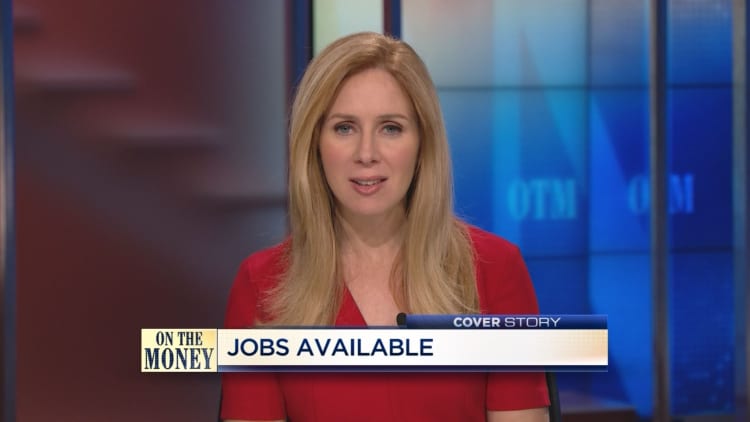The nation's unemployment insurance program has run into a big problem, labor experts and advocates say. It is no longer able to provide protections to an expanding share of today's workers.
Unemployment insurance, established in 1935 by President Franklin D. Roosevelt as part of the Social Security Act, sends weekly checks to workers who have lost their job "through no fault of their own" while they look for another job.
Taxes are paid into the system by employers to cover an employee who loses a job. The basic program is run by the states, but the federal Department of Labor is the overseer. The average unemployment check is around $300 a week.
To qualify, however, you typically have to emerge from a traditional, W-2 employee arrangement. That means "alternative workers" — such as independent contractors and freelancers — generally do not qualify.
If you look at where our economy is heading, the unemployment insurance program is going to be less relevant to a large segment of our workforce.Alastair Fitzpayneexecutive director of the Future of Work Initiative
That's a problem, experts say, because the ranks of these workers have swelled by 66 percent from 2005 to 2015, and they now make up around 16 percent of the U.S. workforce. And, according to the Government Accountability Office, they are twice as likely as traditional employees to report having been laid off the previous year.
As technology and automation continue to recalibrate the way we work, this trend away from traditional employment is likely to accelerate, said Alastair Fitzpayne, executive director of the Future of Work Initiative and the co-author of the recent report "Modernizing Unemployment Insurance for the Changing Nature of Work."
"If you look at where our economy is heading, the unemployment insurance program is going to be less relevant to a large segment of our workforce," Fitzpayne said.
Lawmakers and labor experts have proposed these initiatives to bring unemployment protections to the growing gig economy.
Updating unemployment
Many of the proposals try to make the current system applicable to more workers, rather than reinvent the wheel.
For example, legislators in Washington state recently introduced a bill that would allow independent contractors who work on online platforms such as Uber to contribute to a benefits program through that platform. The funds would be managed by a nonprofit. Although the legislation focuses on workers' compensation, Fitzpayne said it creates a "first of its kind" mechanism to provide a whole host of protections to alternative workers. "Traditional and nontraditional workers are on a level playing field when it comes to benefits," he said.
Some states, such as Virginia, allow self-employed individuals to opt in to the unemployment insurance program if they incorporate, hire themselves as a W-2 worker and pay unemployment insurance on their wages. If your work dries up, you can file for and then collect the weekly payments as an employee.
But most states still require individuals to be searching for full-time traditional employment to qualify. This might not work for a formerly self-employed individual who wishes to remain his or her own boss. It also limits former employees from seeking opportunities outside of traditional employment.
However, nine states — Delaware, Maine, Mississippi, New Hampshire, New Jersey, New York, Oregon, Pennsylvania and Rhode Island — offer Self-Employment Assistance Programs. That's unemployment insurance for individuals working full time to launch a business.
The Center for American Progress, the National Employment Law Project and the Georgetown Center on Poverty and Inequality have proposed requiring states to offer this program or else lose a tax benefit.
Individual savings accounts

Indivar Dutta-Gupta, co-executive director of the Georgetown Center on Poverty and Inequality, pointed to another system that could protect alternative workers from unemployment, in which workers fund a savings account that could be used in case of income or job loss.
One proposal, by MIT economist Jonathan Gruber, calls for Individual Security Accounts, in which the federal government would make contributions to a publicly managed individual account for every dollar a worker earned — regardless of their status as employee or independent contractor. Workers could withdraw this money if their earnings declined or disappeared.
"If workers are forced to contribute, and it replaces unemployment insurance, then it would save the government money," Gruber said. "If the government helps subsidize worker contributions, it could cost the government money."
One clear upside to this proposal, said Dutta-Gupta, is that you don't need to worry about eligibility to save — or collect— your own money.
"It's usually more liberal how you can access the money," Dutta-Gupta said. "Think about your own retirement savings — you can withdraw at any point, you just pay penalties."
Job-seekers allowance
Yet another proposal before Congress, Dutta-Gupta said, was a so-called job-seeker's allowance. The allowance could be applied in a variety of ways, including providing a weekly stipend of around $180 for 13 weeks while individuals search for a job.
The program would serve more than 5 million job seekers a year and cost the federal government around $10.9 billion annually. It would be available to any type of worker. The United Kingdom has a similar job-seeker's allowance, which research shows has "increased transitions to employment among young adults."
Whichever proposal takes off, it is this current dynamic that needs to evolve, Fitzpayne said. "The social contract is delivered through traditional employment."
More from Personal Finance:
How to keep from going broke from your friend's side hustle
4 tips for improving happiness with your job
Now is a great time to land a new job. Here's how


